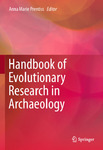| dc.description.abstract | Evolutionary archaeology has developed from a marginal discussion to a mainstream focus in modern
archaeology. Archaeologists have become widely aware that the rigorous procedures developed in
the guise of evolutionary research can provide significant insight into a host of phenomena including
technological change, migration, subsistence adaptation, demography, sociality, and cognition on long
and short scales (Lycett 2015). This handbook is designed as a guide to current research trends,
insights, and contributions of evolutionary research in archaeology. The theoretical focus in all
chapters is Darwinian evolution process inclusive of perspectives broadly derived from the modern
evolutionary synthesis (Huxley 1942) and the emerging extended evolutionary synthesis (Laland et
al. 2015). Contributions to the book are not about neoevolution and other social science paradigms
more influenced by the writing of Spencer (1857; e.g. Harris (1979); White (1959)). Given the focus
on archaeology, the book also excludes specific coverage of evolutionary psychology though issues
of cultural transmission and cognitive archaeology at times take us into psychological realms. Finally,
this is not specifically a book about paleoanthropology though the models of evolutionary archaeology,
human ecology, and evolutionary cognitive archaeology offer a wide range of contributions to our
understanding of human bio-cultural evolution. | en_US |

